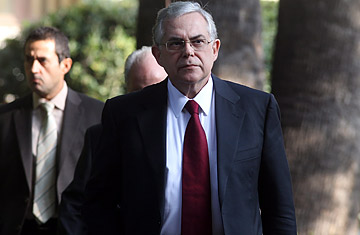
Greece's new Prime Minister Loukas Papademos exits the presidential mansion in Athens on Nov. 10, 2011
Prime Minister of Greece may be the worst job in Europe, but Lucas Papademos took it anyway. The bespectacled economist who was sworn in on Friday, alongside a new Cabinet tasked with implementing a landmark bailout deal that everyone hopes will save the country — not to mention the entire euro zone. The new unity government includes ministers from the cabinet of the center-left PASOK party, namely Finance Minister Evangelos Venizelos. The main opposition conservatives, New Democracy, are also represented as is a smaller right-wing party called LAOS, or the Popular Orthodox Rally. Left-wing parties refused to join coalition talks or join the cabinet.
As a former vice president of the European Central Bank (ECB), Papademos is well respected and already adept at negotiating with euro-zone heavyweights. He must act quickly to convince international lenders — a troika that includes the European Commission, the ECB and the International Monetary Fund — that Greece will stick to the bailout terms hammered out last month. While some details still need to be negotiated, the overall deal includes a major debt swap and is worth about $177 billion.
Greece's partners need plenty of convincing after outgoing Premier George Papandreou's unexpected announcement that he would ask his people to vote on the latest bailout terms in a national referendum — a move that left global markets reeling on fears Greek voters would scupper the plan. Indeed, the idea angered European lenders so much that they talked openly of forcing Greece out of the euro zone. France and Germany even froze the latest installment of their loans to Greece — some $11 billion — leaving its government without enough money to pay next month's bills.
Most Greeks want to stay in the euro zone although they're balking at the austerity measures Greece's creditors have demanded. Papademos' biggest challenge is trying to convince Parliament to approve further belt-tightening when people clearly don't want it. Many worry more cutbacks will only exacerbate the social unrest that has plagued Greece since its first round of austerity measures 18 months ago, while others say the 64-year-old doesn't have the savvy to handle both Greek politicians and antiausterity protesters, who have accused him of engineering a "financial coup" to assume leadership of the country.
"I am not a politician, but I have exercised economic policy in Greece and Europe," Papademos told reporters outside the presidential palace in Athens on Thursday, just after he had been appointed Premier. He said his priority was to stay in the euro zone. "It won't be an easy road," he said. "But I'm convinced the problems will be solved. They will be solved faster, with less cost and more efficiently, if there is unity, agreement and prudence."
Unity may be his biggest challenge in a country as polarized as Greece. Aside from fighting between its two main political parties — the center-left PASOK party and the center-right New Democracy party — left-wing parties have refused to join coalition talks and are demanding immediate elections. Meanwhile the leader of New Democracy, Antonis Samaras, effectively stalled negotiations by refusing to sign a document in support of the bailout agreement — part of the party's bid to increase its advantage in next year's elections by coming out against the new coalition government. As the fighting over who would succeed Papandreou dragged on, media reports varied wildly; first Papademos was in, then he wasn't. Other names were floated. The leadership vacuum prompted one radio talk show to ask listeners to pick a Premier. They offered everyone from Vladimir Putin to Tintin.
